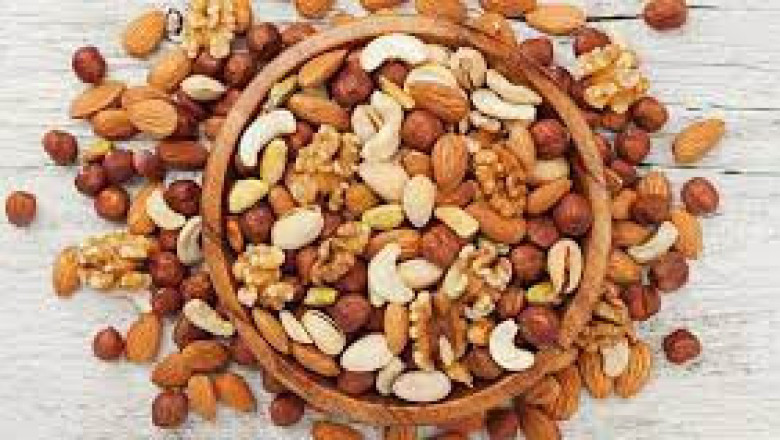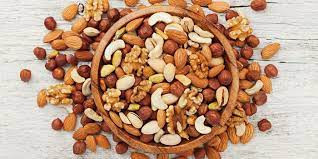views


Introduction
Heart disease remains one of the leading causes of death worldwide, prompting a surge in research on preventive strategies. Among various dietary recommendations, consuming nuts has emerged as a powerful ally in maintaining heart health. This article delves into how integrating nuts into your diet can significantly reduce the risk of heart disease.
The Nutritional Profile of Nuts
Nuts are a powerhouse of nutrients, including healthy fats, proteins, vitamins, and minerals. Each variety, from almonds to walnuts, boasts its unique blend of nutrients, many of which are pivotal for heart health.
Reducing Cholesterol Levels
Nuts are rich in unsaturated fats and omega-3 fatty acids, known for their cholesterol-lowering effects. Regular consumption can lead to a significant reduction in bad cholesterol levels, thereby reducing heart disease risk.
Lowering Inflammation
Chronic inflammation is a key contributor to heart disease. The antioxidants and polyphenols found in nuts help combat this inflammation, promoting a healthier heart.
Improving Artery Health
Nuts also contain L-arginine, which improves the health of artery walls, making them more flexible and less prone to blood clots.
Types of Nuts and Their Benefits
Each type of nut brings its unique benefits to the table. Almonds, for instance, are high in Vitamin E, while walnuts are renowned for their high omega-3 content. Pistachios offer high levels of lutein and zeaxanthin, beneficial for eye health, and other nuts like cashews and hazelnuts contribute to heart health in their distinct ways.
Scientific Studies Supporting the Benefits of Nuts
Numerous studies have shown a correlation between nut consumption and reduced risk of heart disease. These studies highlight the role of nuts in lowering cholesterol, reducing the risk of blood clots, and improving the lining of the arteries.
Overview of Key Research Findings
Research consistently shows that people who eat nuts regularly have a lower risk of developing heart disease compared to those who don't. For example, a study published in the "New England Journal of Medicine" found that participants who consumed nuts daily saw a 20% reduction in all forms of death, including heart disease.
Analysis of Data and Results
Most research suggests that consuming a handful of nuts daily can lead to significant heart health benefits. These findings hold true across various types of nuts, indicating that variety can also be beneficial.
Incorporating Nuts into Your Diet
Incorporating nuts into your diet is easier than you might think. A handful of nuts per day, either as a snack or part of a meal, can make a substantial difference. However, it's essential to consume them in moderation due to their high-calorie content.
Recommended Daily Intake
A daily serving of about 1.5 ounces, or a small handful, is recommended. It's important to mix different types of nuts to ensure a variety of nutrients.
Creative Ways to Eat Nuts
Nuts can be incorporated into salads, yogurts, or even as part of a trail mix. They also make for a healthy topping on oatmeal or baked goods.
Precautions and Considerations
While nuts are beneficial, it's crucial to be mindful of allergies and to choose unsalted, unroasted varieties to maximize health benefits.
The Role of Diet in Heart Disease Prevention
A balanced diet, rich in fruits, vegetables, whole grains, and lean proteins, along with nuts, forms the cornerstone of heart disease prevention. Other heart-healthy foods include oily fish, berries, and green leafy vegetables.
Debunking Myths About Nuts
Despite their high fat content, nuts are not inherently fattening if eaten in moderation. Also, while nut allergies are serious, they affect only a small percentage of the population, and numerous nut varieties are available for those with specific allergies.
Lifestyle Factors and Heart Health
Besides diet, other lifestyle factors such as regular exercise and effective stress management play a crucial role in maintaining heart health.
Comparing Nuts to Other Heart-Healthy Snacks
When compared to other snacks, nuts stand out for their nutrient density and heart-healthy fats. They offer a better balance of nutrients than many processed snack options.
Why Nuts are a Superior Choice
Nuts provide a unique combination of fiber, protein, and good fats, making them a more satisfying and heart-healthy choice compared to other snacks.
Challenges in Nut Consumption
Accessibility and cost can sometimes be barriers to regular nut consumption. However, buying in bulk and choosing local varieties can help mitigate these challenges.
Overcoming These Challenges
Shopping for nuts in bulk or during sales, and opting for less expensive varieties like peanuts, can make regular consumption more feasible.
Patient Testimonials and Success Stories
Many individuals have shared their positive experiences with incorporating nuts into their diet, reporting improved cholesterol levels and overall heart health.
Impact on Heart Health
These testimonials often highlight significant improvements in heart health markers, reinforcing the scientific evidence supporting nut consumption.
Expert Opinions and Recommendations
Health professionals universally recommend nuts as part of a heart-healthy diet. They emphasize the importance of variety and moderation in nut consumption.
Quotes from Health Professionals
Experts often cite the numerous studies supporting nuts' benefits, advising their inclusion in a daily diet for optimal heart health.
Summarized Advice
The general consensus is to consume a variety of unsalted, raw or dry-roasted nuts regularly but in moderation.
Future Research Directions
Ongoing research continues to explore the extent of nuts' benefits, looking at different populations and long-term effects.
Emerging Studies
New studies are examining the specific impacts of different types of nuts on various aspects of heart health.
Potential Developments
Future research may provide more detailed guidelines on nut consumption and its role in preventing other diseases.
Conclusion
In summary, incorporating a variety of nuts into your diet can play a significant role in reducing the risk of heart disease. This simple dietary change, combined with other healthy lifestyle choices, can have a profound impact on your heart health.












Comments
0 comment